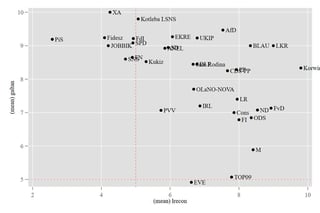Time has gone by, parties have changed, a little – it's time for an update.
Yes, without a shred of doubt, they are "really an extreme right nationalist party"!
In fact, the members of the party and its voters are properly called Nazis.
Let's start with one example of egregious proportions:
The speaker for the AfD in Saxony was caught repeatedly alluding to racist themes, dog whistling antisemitism and nationalism. Just for that a court found that calling him "Neo-Nazi" is justified and compliant with freedom of speech, as it argued that it must be possible to speak the truth and call a duck a duck.
He even wears a shirt with badge that signifies "I am a Nazi, old school, in the Himmler tradition, just like the commander of Auschwitz, both members of this 'blood and soil'-movement":
Twitter
https://twitter.com/Chronik_ge_Re/status/1132596336946290688
 >
> 
In case you do not recognise the logo the nazi on the right is wearing: it is the Artaman movement logo. His biography is just what you'd expect, disseminating fear and hatred in right-wing populist newspapers like 'Morgenpost' and 'Bild' (from 1994–2014 overseeing the section "politics"!), weapons collector. Now contributor to extreme right paper "Junge Freiheit". (All in his self-written biography (PDF)). On facebook he likes to share pictures of dog races, anti-muslim memes and the occasional SS-memorabilia he likes to display around Christmas.  . As a bonus he was asking around whether somebody would know "how to knife", while criticising chancellor Merkel, just barely scratching around an appeal to assassinate her. He was just elected again.
. As a bonus he was asking around whether somebody would know "how to knife", while criticising chancellor Merkel, just barely scratching around an appeal to assassinate her. He was just elected again.
The chairman of that party in Saxony since February 2018 is Jörg Urban. When he ran for office as mayor, he mostly spoke about 'foreigners:
"Knife Moroccans are neither cultural enrichers nor much-needed skilled workers." (src)
The official German Federal Office for the Protection of the Constitution is itself rather right-leaning, but still, it compiled a report and concluded:
Jörg Urban, state chairman of the Saxon AfD and faction leader of the AfD state parliament faction there, explained as follows:
"A people can only preserve its own unity and freedom if it remains largely homogeneous. In the course of its history, Germany has welcomed and integrated many immigrants from neighbouring cultures. But everything has borders (limits)"
Urban sees "extensive homogeneity" as a positive prerequisite for unity and freedom. He stresses that this "far-reaching homogeneity" recognises the acceptance and integration of "neighbouring cultures" - i.e. immigration from primarily European countries - as an achievement of Germany. Although he seems to see a "border" of immigration where this "border" is to be drawn after him, he does not elaborate.
Conspiracy theories and white supremacy are his daily bread and butter:
Jörg Urban on 29 April 2018:
"However, the Greens are less concerned with solving problems in the care sector than with keeping as many illegal foreigners as possible in Germany. Like their leader Joschka Fischer, the Greens are concerned about the dissolution of Germany. Our culture and our way of life will be watered down and dissolved."
Moreover, a strict hierarchization according to ethnic criteria is immanent in ethnically nationalistic social images. This also implies a defamation of those who are not part of one's own, upgraded group. This defamation and unequal treatment is a violation of the prohibition of discrimination in Article 3.3 of the Basic Law. At the AfD management level, statements can sometimes be made which point to a corresponding view of the world. Thus Jörg Urban assumes a higher educational disposition in the "white European culture":
"The fact that one can study in Germany even without rich parents in well-equipped universities has a lot to do with a white European culture.
Sometimes this interpretation also leads to the equation of Islam and Islamism. For example, Jörg Urban, regional chairman of the Saxon AfD and leader of the state parliamentary group there, agitated against an alleged "Islamization" and the "advance of Islamists in our schools" on the basis of the debate about Islam-compliant school meals:
"It is frightening to read what excesses already exist here. There is talk of a quasi-prohibition of pork ham on the break bread. Or the ban on gummy bears, because the gelatine they contain is not 'halal'. […] As AfD we will oppose the advance of the Islamists in our schools with everything humanly possible. No headscarves in the classroom and again schnitzel in the school meals!
This report has a very clear conclusion over all: this party is not only right-wing and nationalist. It was from the start and is increasingly national-socialist imprinted, disseminates faked news and lies, fear and hatred, harbours antisemites and anti-muslim propagandists and recruits much of its personnel from organisations that are known nazis. For now, the official report speaks of 'tendencies' among the more extreme wings of that party. It seems liekly to me that just citing all the statements of leading AfD members from that report alone would risk suspension here on StackExchange.
The member of parliament Stefan Keuter has a more conservative taste for decorating Christmas time:

But whether it is his 'sense of humour' or honest confession, the interior design taste on display of this still sitting MP leave little doubt:

Image sources for what Keuter shared online: correctiv.
How much of this so called "wing" actually is identical with the party structure and dominant topics, themes and positions may be exemplified with the overly popular member Björn Höcke, who is frequently compared to Mr Goebbels, and allegedly even tries to imitate not only the general direction and ideology, but the actual speech patterns of Goebbels.
That fits together rather too well with the current chairman on the federal level. For him, the thirties under Hitler, including the Second World War, its atrocities and the Holocaust, are historically "nothing but a bird dropping".
Looking at the most prominent members for the recent state elections one gets an ever browner picture:
Chairman of the party in Brandenburg Andreas Kalbitz former member of the right-wing CSU which he appealed to move further to the right (Bernd Siegler: Scheinoffensive der CSU gegen Rechts. in: taz, Nr. 3840, 22. Oktober 1992.) Then member of the extremist right-wing Republikaner before joining AfD. Known for marching with other neo-nazis, like with NPD members in Athens and visitor to later forbidden nazi summer camps of the Heimattreue Jugend. His whole biography is undoutably and entirely right-wing extremism.
Björn Höcke is the main protagonist of the even more right-wing Flügel ("Wing") within the party. An antisemite with "dissenting views" about the Holocaust.
Social scientists, historians and the Federal Office for the Protection of the Constitution (Bundesamt für Verfassungsschutz, BfV) have found in Höcke's statements and positions right-wing extremism, racism, historical revisionism, partly anti-Semitism and the adoption of the language and ideas of National Socialism.
–– Wikipedia: Björn Höcke
One of his speeches directly calls for viewing the time of national-socialism as something positive, which was loudly applauded by all the nazis listening. This former history teacher is also fond of publishing poems from the Hitler Youth.
A quite detailed and accessible analysis is found in Hajo Funke's FUNKE| AFD – GEFÄHRLICHER ALS DIE NPD|JEDE AFD-STIMME IST VERSCHENKT! HINTERGRUNDINFORMATION ZU DEN LANDTAGSWAHLEN
Since the evidence is there and overly clear, why not follow the court ruling and describe this party and its sympathisers as what they are: they are nazis.
Oh, almost forgot: Yes, the voters and sympathisers have to be called as done above. At least if you give a sth after reading scientific studies that come to this very conclusion:
Martin Schröder: "AfD-Unterstützer sind nicht abgehängt, sondern ausländerfeindlich", SOEP — The German Socio-Economic Panel study at DIW Berlin, SOEPpapers on Multidisciplinary Panel Data Research, 975, 2018. (PDF) [Title: "AfD supporters are not economically vulnerable, but xenophobic" ]
With the AfD, as well as movements like Pegida, a public channel has been created that can open perspectives for a quantitative expansion of efforts to encourage the acceptance of New Right positions. However, these organizations in no way fulfill New Right aspirations to intellectuality, let alone cultural metapolitics, so that it will be interesting to see whether the short-term successes of New Right strategies will falter on precisely this contradiction, when the camouflaging strategy—according to which personal sympathies for National Socialism need to be hidden from public view— finally collapses. After all, it is no accident that Pegida founder Bachmann was publicly toppled by a photo in which he had styled himself to look like Hitler (with toothbrush mustache and side parting), further adding the caption “He’s back!”—thereby revealing his true motives behind the Pegida facade, with its initial veneer of public respectability. This shows that behind the mask (which also borrows from New Right strategies in terms of camouflaging one’s own terminology), aspects of National Socialism often peek through—mostly in an openly affirmative way, but almost always as a kind of historical foil for one’s own political fantasies, without necessarily entailing an ability to see one’s own nationalist identitarian goals in the context of Auschwitz.
Samuel Salzborn: "Renaissance Of The New Right In Germany?
A Discussion of New Right Elements in German Right-wing Extremism Today", German Politics and Society, Volume 34 (2016): Issue 2 (Jun 2016) (DOI)
Berning, Carl C. (2017): "Alternative für Deutschland (AfD) – Germany’s New Radical Right-wing Populist Party", ifo DICE Report, ISSN 2511-7823, ifo Institut - Leibniz- Institut für Wirtschaftsforschung an der Universität München, München, Vol. 15, Iss. 4, pp. 16-19. (PDF)
Writing less than three years ago, one distinguished scholar noted that “the meteoric rise of the AfD and its ability to steer clear of Nazi connotations is a very unusual and significant development.”15 As this article has argued, how- ever, it was also short-lived. The AfD radicalized within a short period of time, and in this sense its experience mirrors other political parties to the right of the CDU that have tried to preserve enough moderation to make them potential coalition partners in government. The AfD’s embrace of anti-immi- gration and historical revisionism ensures that it will be treated like a pariah in the Bundestag. When leading figures in the party refer to Turks as “camel drivers” and “unpatriotic rabble” who should “return to their mud huts and polygamy,” their vitriol helps legitimize the strategy of containment.
But, will containment still work now that the AfD is in the Bundestag, heading up important parliamentary committees, and introducing legisla- tion on immigration and national identity at a rapid clip? Will it be effective given that the AfD is now the largest opposition party in parliament and is running ahead of the SPD in some public opinion polls in early 2018? And if the AfD consolidates its recent gains in state parliaments and reproduces its 2017 performance in the next federal elections, is the end of Germany’s exceptional resistance to nativist political forces nigh?
While I would still bet on the AfD collapsing in the short to medium turn, and while Merkel has vowed to get the party out of parliament, one can no longer rule out the less rosy scenario. The consequences for German and European politics would be so dramatic that I cannot even begin to lay them out here.
David Art: "The AfD And The End Of Containment In Germany?", German Politics and Society, Issue 127 Vol. 36, No. 2 (Summer 2018): 76–86. doi:10.3167/gps.2018.360205
Like the court ruling, researchers conclude:
But if one looks back at the short history of the AfD, in most respects a departure from the original ideals can be observed. The development mentioned here went hand in hand with a political "shift to the right", which was associated with an emotionalization and polarization of the tone. The moderate relatives left the party, lost influence in it, or adapted to the "shift to the right," while the members to the far right did not have to fear party exclusions and became increasingly important.
As a result, the AfD developed away from a right-wing democratic view and towards a right-wing extremist orientation. One finds this in the party not only on the fringes, but in the centre: the denial of individual rights, manifestations of racist positions, the delegitimization of the elected government, demands for a change of system, ethnicization and monopal claims to popular understanding, the negation of religious freedom of equal rank, a tendency to conspiracy ideological ideas, generalizations through xenophobic stereotypes and the relativization of anti-Semitism and the Nazi past. The lack of differentiation from the identities corresponds to the lack of differentiation from other right-wing extremists. On balance, this means that the AfD itself now has to be regarded as a right-wing extremist party. Although its intensity of extremism is lower than that of the NPD or neo-Nazi scene, this does not change the facts of the case.
This interpretation does not ignore the fact that there are still right-wing democratic minorities in the AfD. They occasionally try to succeed, but have failed on a regular basis. As such, they therefore currently tend to form a fig leaf that conceals the actual character of the party. Since even relevant scandals do not lead to a decline in survey approvals, the strategic restraint in statements and actions is waning more and more. If even joint demonstrations with neo-Nazis do not suggest a decline in votes, then from the perspective of the actors there is less and less need for moderation in public perception. This political development is also remarkable in a cross-national comparison: while the actors in Europe who are regarded as right-wing populists tend to focus on moderation for the sake of higher vote wins, the AfD apparently needs this less in view of survey values and election successes. The trend towards right-wing extremism is likely to continue.
Armin Pfahl-Traughber: "Die AfD und der Rechtsextremismus. Eine Analyse aus politikwissenschaftlicher Perspektive", essentials, Springer VS: Wiesbaden, 2019. DOI
Visualised we see the AfD as a whole is firmly positioned on whever the right-wing is:

Source: Tarik Abou-Chadi of Zürich University citing Chapel Hill Expert Survey (CHES)
Or within the spectrum of 181 European parties:

Yannik Buhl, Christian Endt und Sarah Unterhitzenberger: "So sieht Europas Parteienlandschaft aus", Sueddeutsche Zeitung, 2019
And finally:
Using secondary and German‐language sources, the commentary documents the AfD‐Nazi link based on statements made by AfD members and leaders. This article concludes that the AfD might indeed be called Germany's new Nazis.
Thomas Klikauer: "Alternative for Germany: Germany's new right‐wing extremists", Journal of Labor & Society, Volume 21, Issue 4, December 2018. (DOI)






